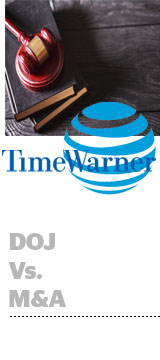 Here’s today’s AdExchanger.com news round-up… Want it by email? Sign up here.
Here’s today’s AdExchanger.com news round-up… Want it by email? Sign up here.
Trust Or Antitrust
Opening statements began on Thursday in the closely watched antitrust trial between the US Justice Department and AT&T challenging the telco’s $86 billion deal for Time Warner. Both sides’ arguments were laid out earlier this month in pre-trial briefings [more on that], but now the lawyers are filling in some detail. The government projected the merger would lead to $400 million annually in price hikes for US subscribers, as AT&T forces pay-TV rivals to accept higher prices on Time Warner’s Turner Networks. The DOJ cited internal emails saying Dish’s rival Sling streaming service would be crap (to paraphrase) without Turner, reports Reuters. AT&T argued the company needs a content arm to compete with online platforms like Alphabet and Amazon. With improved user data for targeting ads, AT&T will earn more from brands and can use the revenue to lighten costs for subscribers, according to its lawyers. More.
Location Power Play
Snap launched a suite of location tools, including more flexible geofencing and an expansion of its Snap to Store product, which measures whether an ad on Snapchat drove someone to a store. Snap will also now let advertisers target real-world spots such as beaches, stadiums and coffee shops. The location tools are based on Snap’s daily sessions and won’t leverage Placed, the location data company Snap acquired last year that bases its data on an independent panel of mobile app users. “This is about baseline visitation,” Max Maxwell, Snapchat’s director of revenue product for audience, tells Adweek’s Lauren Johnson. “[It] gives pre-campaign guidance to advertisers to where they would want to reach their audience overall.” More.
Makes ’Cents
Naspers, the Cape Town-based ecommerce and media company, invested $32 million in 2001 for a third of the then-obscure web business Tencent, which served a Chinese population almost entirely unconnected to the internet. Yesterday it sold off 2% of Tencent stock for a $10.6 billion payout, the first cash return on one of the best-ever venture capital bets, writes Bloomberg. Naspers’ stock plunged because the market forecasts continued growth for Tencent, but some analysts said it makes sense for the South African company to unwind pieces of its Tencent holdings to reinvest in its own products. Yahoo is a cautionary tale for this exact scenario, as its core business vaporized while the company floated on a successful early stake in Alibaba. More.
Zuck Hits The Press
After breaking his silence with a Facebook post Wednesday [AdExchanger coverage], CEO Mark Zuckerberg spoke to reporters at The New York Times, CNN, Recode and Wired about the Cambridge Analytica scandal. Zuckerberg held off on commenting until now because he “wanted to make sure we had a full and accurate understanding of everything that happened,” he told the Times. As for Facebook’s plan moving forward, Zuckerberg reiterated priorities for reducing data exposed to developers, such as investigating apps Facebook shared data with before 2014 and blocking access if a user hasn’t opened an app in three months. Facebook will also notify every individual whose data was pulled by Cambridge Analytica. “The point of what we’re trying to do here is to create a situation where we have a real person-to-person relationship with any developer who is asking for the most sensitive data,” he said. But without any systemic regulations around data sharing on the platform [AdExchanger coverage], Facebook has a long way to go to police what happens outside of its ecosystem.
But Wait, There’s More!
You’re Hired!
This post was syndicated from Ad Exchanger.

More Stories
By the Book: How ‘The Fugitive’ Director and an Investigative Journalist Collaborated on 2024’s Timeliest Thriller
The Best Holiday Ads of 2024
The Year in Ratings: How the Major News Outlets Performed in 2024